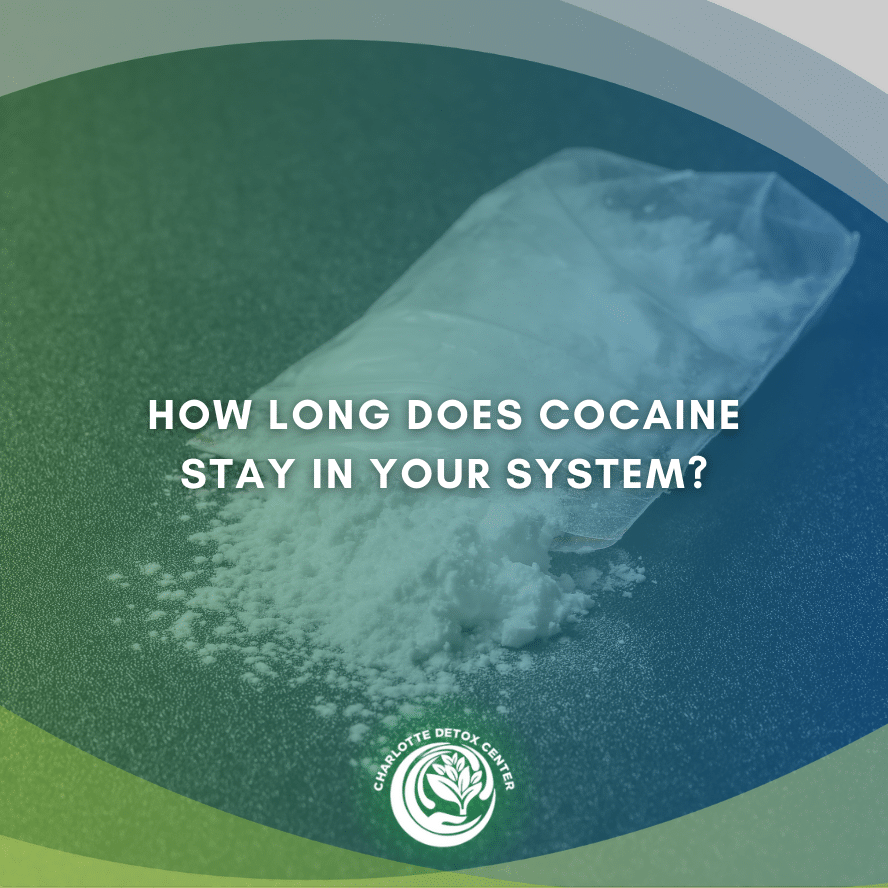How Long Does Cocaine Stay in Your System?

Medically Verified: 2/1/24
Medical Reviewer
Chief Editor

All of the information on this page has been reviewed and verified by a certified addiction professional.
Cocaine usually stays in your system for 1 to 4 days, but it can be detected in some people’s bodies for a couple of weeks. The detection time depends on a handful of individual health factors, use patterns, and the type of drug test used to screen for the substance.
Understanding the timeline of cocaine’s effects and how long it takes to leave your body can help you prevent mixing the drug with other substances, know when symptoms of withdrawal may set in, and estimate how long cocaine will show up on a drug test.
How Long Do The Effects of Cocaine Last?
The energizing, stimulating high produced by cocaine occurs quickly, but it wears off rapidly as well. Most cocaine highs last between five and 30 minutes depending on the method of ingestion (snorting, smoking, or injecting). The majority of cocaine users snort the drug because it is the slowest method of use meaning it produces a longer-lasting high.
Since cocaine is such a rapidly acting drug, many people who use it binge on it, using the drug periodically over a period of several hours to extend the duration of the high. Binging on cocaine or using it for several days in a row can increase the amount of time it stays in your system.
Understanding the Half-Life of Cocaine
The reason why cocaine is so fast-acting is that it has a very short elimination half-life. The elimination half-life of a substance describes how long it takes half of the drug’s concentration to be metabolized. The half-life of cocaine is approximately 1-1.5 hours.[1] It generally takes 4-5 half-lives for a substance to leave your system completely, meaning cocaine can stay in your system for 4-7.5 hours after a single-use.
Even though cocaine leaves your system quickly, the liver and kidneys metabolize cocaine into metabolites. About 40% of cocaine hydrolyzes into a metabolite called benzoylecgonine–the metabolite that drug tests screen for. Benzoylecgonine has a longer half-life of 5.5-7.5 hours.[2] This means the metabolite is detectable in your system for 27-37 hours after a single dose of cocaine.
What Factors Determine How Long Cocaine Stays in Your System?
Despite the fact that cocaine is a short-acting drug that produces a quick high, it can be traced in your urine, blood, saliva, and hair for a few days to several months. However, the exact timeline can vary greatly from one person to the next. For example, some people have slower metabolisms than others, meaning it will take them longer to metabolize cocaine and the drug will remain in the body longer.
One of the largest influential factors in the detection time of cocaine is the pattern of cocaine use. If you have been using cocaine every day for several years, it will stay in your system far longer than it will in someone who has only used it one time. How long, how often, and at what dose you used cocaine can all influence your drug test results.
Other factors include:
- Height
- Weight
- Age
- Liver and kidney function
- Polydrug use
- Method of administration
- Test type
How Long Does Cocaine Stay in Your System?
There are several different ways to detect cocaine in your body. The most common include:
Urine
Urine drug tests are cheap, reliable, and simple, so they are the most frequently used test type. Most urine tests can detect cocaine for 3-5 days after use.[3]
Blood
Cocaine doesn’t stay in your blood for very long, so this test type is rarely used. Blood tests are typically only used in a medical setting because they are somewhat invasive. Cocaine can be detected in the blood for 5-7 hours after use.
Saliva
Saliva tests are more expensive than other forms of testing, but they are sometimes used. Cocaine can be detected in saliva for 1-3 days after use.
Hair
Hair follicle drug testing is expensive and less common than other forms of testing. All drugs, including cocaine, can be detected in hair for up to 90 days after use.
Breast Milk
Although breast milk isn’t usually tested for drugs, cocaine can stay in breast milk for up to 36 hours and can be extremely harmful to nursing infants. If you are a breastfeeding mom, it’s vital that you abstain from cocaine use. Cocaine exposure in infants can cause mood swings, crying, dilated pupils, tremors, and seizures.[4]
Find Help for Cocaine Abuse and Addiction
Cocaine is an extremely addictive stimulant drug, and if you are unable to stop using cocaine for an upcoming drug test, it’s likely that you have a problem with the drug and can benefit from professional addiction detox and counseling services.
If you or a loved one is seeking help for cocaine addiction, look no further. Our stimulant detox in North Carolina is the perfect place to start. As a family-owned and operated drug and alcohol treatment provider, we are dedicated to helping patients and their families heal from the chaos of substance abuse. Staffed by a team of expert clinicians and physicians, we are ready to meet all of your detox and rehabilitation needs.
Contact us today to see if our cocaine addiction treatment program in Charlotte, North Carolina is right for you.
References:
